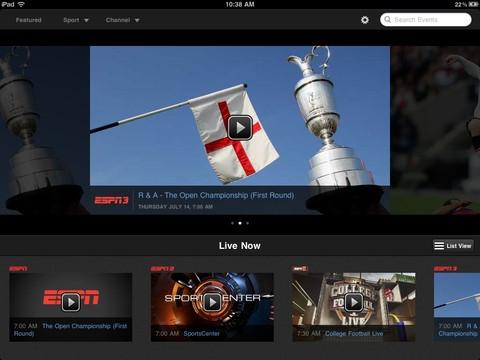With iPhone owners restricted by capped data plans on the largest U.S. carriers, cable sports network ESPN has expressed interest in potentially subsidizing those data plans to allow users to stream video without worrying about overage fees.
ESPN has allegedly had discussions with at least one major U.S. carrier about the plan, according to The Wall Street Journal. The two largest carriers in America, Verizon and AT&T, both carry the iPhone and both restrict new customers with capped data plans.
The concept proposed by ESPN could guarantee that content streamed from the network would not result in data plan overage charges. The network has reportedly expressed interest in either paying carriers outright, or giving them a share of advertising revenue.
But the alleged deal isn't imminent, the report said, as questions remain about the economics, and the fact that any agreements could run afoul of government regulators.
Carriers such as Verizon and AT&T are said to be interested in content deals as a way of increasing revenue without raising fees for subscribers.
ESPN has aggressively pursued mobile streaming capabilities as smartphones and tablets have gained in popularity. The network's WatchESPN application allows users with participating cable subscribers to stream live sporting events from the ESPN family of networks.
Content available on WatchESPN includes the NBA regular season and playoffs, major golf tournaments like The Masters and U.S. Open, college football and basketball, and thousands of other live events. The service also streams original ESPN shows like SportsCenter, Pardon the Interruption, and Mike and Mike in the Morning.
But smartphone users might be reluctant to use live streaming video services like WatchESPN on the go because of restrictive mobile data plan caps in place via wireless carriers. Both Verizon and AT&T charge customers a $15 fee for each gigabyte consumed in excess of their data plan cap.
Watching low-quality video for one hour uses about 200 megabytes of data, according to data compiled by GigaOm. For an hour of high-definition video, a user might expect to see 400 megabytes of usage on their mobile data plan.
 Neil Hughes
Neil Hughes








-m.jpg)






 Christine McKee
Christine McKee
 Malcolm Owen
Malcolm Owen

 Charles Martin
Charles Martin


 Mike Wuerthele
Mike Wuerthele


-m.jpg)






23 Comments
What a horrible future…
I can imagine the cell carriers asking themselves this question: [SIZE=4][I]"... how on earth can history get past people like me?"[/I] [/SIZE] - Captain James T. Kirk (William Shatner, "Star Trek VI: The Undiscovered Country," 1991)
The problem is AT&T and Verizon. T-Mobile and Sprint don't charge overage for going over your limit - you get stepped down to 2G speeds (which might also pose a problem for ESPN frequent users, I suppose but isn't nearly as bad as being charged overage, IMHO). That, combined with TMO's awesome family plans, is why I ditched VZ and ATT for our family (5 phones between 2 carriers). Telecom giants can go screw themselves.
[quote name="Tallest Skil" url="/t/157463/espn-interested-in-subsidizing-mobile-data-plans-to-ensure-users-can-stream-videot#post_2324949"]What a horrible future… [/quote] Why should the carriers brunt the burden of streaming what has been an explosion of data that grows exponentially every year?
[quote name="dasanman69" url="/t/157463/espn-interested-in-subsidizing-mobile-data-plans-to-ensure-users-can-stream-video#post_2325095"] Why should the carriers brunt the burden of streaming what has been an explosion of data that grows exponentially every year?[/quote] Because that is what their business IS? It baffles me why these carriers think data caps are a long term solution to prevent capital expenditures. Look at how many ISP's do not yet have IPv6. The ISP that I run my clients web hosts from have ipv6 enabled, but only one actually enables it to their customers. All data caps do is hurt their business, because it tells companies like Google that they're better off building their own ISP's to put themselves (AT&T/Verizon) out of business. Eventually.